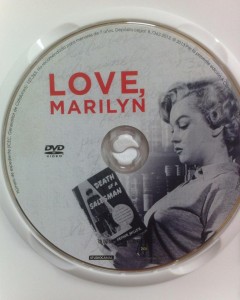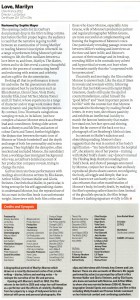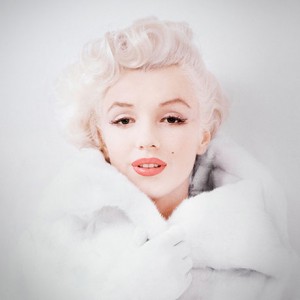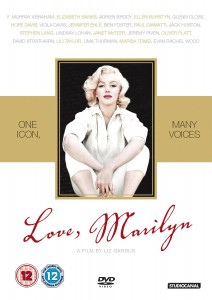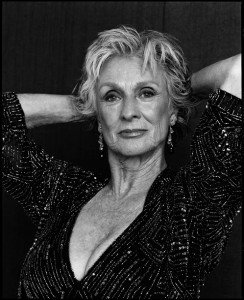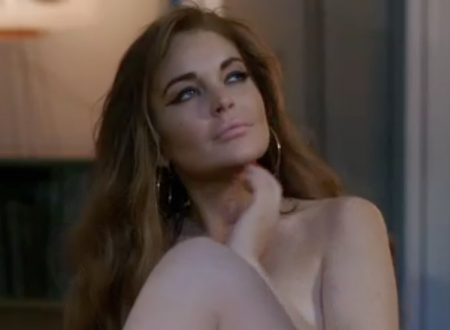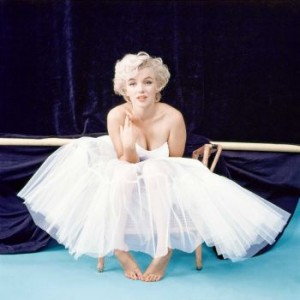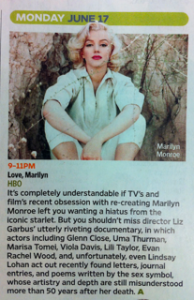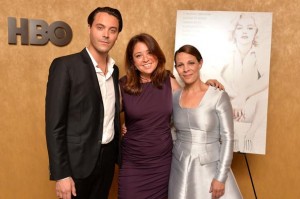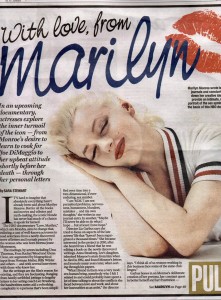“There’s a certain genius to the concept behind Liz Garbus’ documentary…the film itself is kind of a mess, albeit a mess you can’t stop watching because, after all, it’s Marilyn.
The brilliance of the concept, which is not unlike the approach that Todd Haynes took on the life of Bob Dylan in I’m Not There, has to do with Monroe the performer. Pop a camera in her face, and she became a different entity.
The written material itself is fascinating, of course. There may not be any bombshell revelations here, but we get more of a sense of her trying to be authentic as she writes poetry, lists her goals in life and work, and records information about lesser-known Italian Renaissance painters she is studying. It’s not coincidental that the writing becomes more worked-over the deeper she gets into psychoanalysis and dependence on prescription medication, reflecting her growing struggle to know what being authentic really meant.
Garbus was painted into a corner on this project from the beginning: You simply can’t do anything on Marilyn Monroe, even readings of recently unearthed writing, without slamming into the mythology. But having all these actors trying to be Monroe is at times very confusing and even, at times, silly. At those moments, we’re not reminded of the often fragile co-existence of the movie star and the yearning product of many foster homes in the same body but, rather, of the transparency of having other people speak her words.
Of course, the idea behind Love, Marilyn is to reinforce the obvious, that Marilyn Monroe cannot speak for herself. Fortunately, her written words are not entirely drowned out by the artificiality of the film’s concept. The words are hers, and that counts for something.” – David Wiegand, Houston Chronicle
“I confess: Whenever I want a pick me up or a reason to smile I’ll reach not for a bottle of gin but a Blu-ray of Marilyn Monroe singing. ..With her exaggerated diction, delicious double takes, deftly disarming sweetness and that smile, that brilliant lovely, life embracing happy smile, that construct ‘Marilyn Monroe’ which she dreamed up and created as surely as Charlie Chaplin created the Little Tramp has become an enduring archetype.
Love, Marilyn doesn’t try to demystify Monroe much less ‘explain’ her but lets her own voice be the dominant teller of her story. It’s a remarkable, enchanting and, yes, sad movie.” Stephen Schaefer, Boston Herald
“Watching Love, Marilyn, Liz Garbus’ pointed, poetic and occasionally overwrought documentary about the life of Marilyn Monroe, I kept thinking about The Great Gatsby, another tragedy in two acts recently resurrected for our viewing pleasure.
Yet for all the hope pinned on internal illumination, the first thing Love, Marilyn does is remind us how beautiful Monroe really was. Her face has been so thoroughly replaced in popular culture by commercialized replications that the real thing is a surprising thrill to behold.
For fans, there is not much new information here; it’s all in the presentation. Garbus is clearly entranced with her subject, presenting Monroe as both a strong-willed pioneer and a confused victim.” Mary McNamara, Los Angeles Times
“Directed by Liz Garbus, whose previous films include the critical hit Bobby Fischer Against the World (2011), Love, Marilyn is a diverting, at times incisive, yet flawed biography that tries to accomplish two almost contradictory goals: to outline the contours of the Monroe myth and capture some truth about Monroe as a unique individual.
In a nice if at times overbearing gimmick, Garbus approaches her subject by having actors read from a recently discovered cache of journals, letters, and poems written in Monroe’s childlike scrawl.
What’s interesting about Monroe is how she lives on as a myth, in both senses of the word. In one sense, myths sustain the culture. Like the Horatio Alger story, the Monroe myth has become one of those narratives every community needs as a guidepost to its collective identity, its purpose and direction.
The star carefully, actively cultivated her status as a sex symbol, becoming in effect the first modern self-manufactured celebrity commodity. That was also her undoing: The sole purpose of a commodity is to be used up.” – Tirdad Derakshani, Philly.com
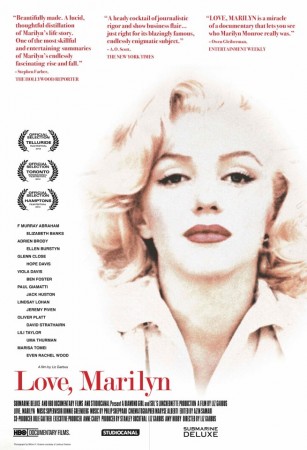
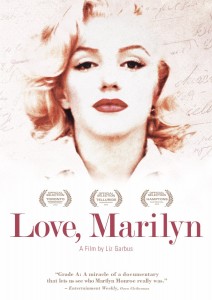 Neil Lumbard’s detailed and insightful review of Love, Marilyn – released on DVD in the US today – has been posted at
Neil Lumbard’s detailed and insightful review of Love, Marilyn – released on DVD in the US today – has been posted at 